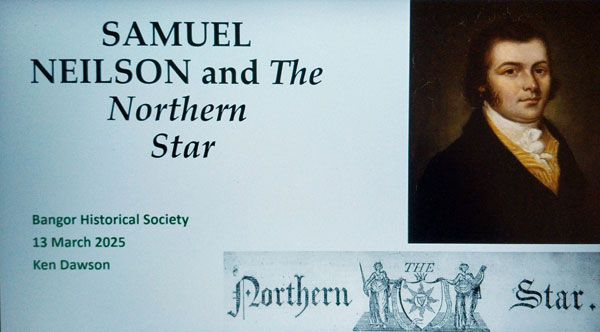On 13 March Bangor Historical Society once more welcomed Ken Dawson as the guest speaker. The subject of his talk was Samuel Neilson and the Northern Star. He has written a book, The Belfast Jacobin, on Neilson’s life, including his involvement with the United Irishmen.

Neilson was born in 1762, the son of the Presbyterian minister of Ballyroney in County Down. He was one of 13 children. He later moved to Belfast where he joined his brother John in the growing city. They had a successful cotton business in Waring Street, the Irish Woollen House.
Like many sons of the manse he became involved in radical politics. The outbreak of the French Revolution in 1789 had a strong effect on Irish politics. There were growing demands for reform of the Irish Parliament whose membership was drawn only from the Protestant minority.
In 1791 Neilson was involved in the establishment of the Society of United Irishmen in Belfast alongside figures such as Wolfe Tone. Neilson’s views were becoming more revolutionary. In 1792 a newspaper, the Northern Star, was set up to promote radical ideas. Neilson was elected as editor. The newspaper, however, attracted opposition because of its call for change and its presses were eventually attacked and destroyed by the Monaghan militia in 1797.
In 1796 Neilson was arrested and taken to Kilmainham Goal in Dublin. He suffered in the cold and damp conditions and was released in February 1798 on health grounds. He then became part of the entourage of Lord Edward Fitzgerald, another revolutionary, in Dublin. He even planned to rescue Lord Edward after the latter’s arrest.
When the rebellion broke out on 23 May 1798, he was arrested and imprisoned in Newgate prison. He was one of a number of state prisoners who gave information to the authorities without implicating any of their colleagues in return for being allowed to go into exile. America, their obvious destination, was not possible and instead they were sent to Fort George, near Inverness in Scotland. Finally in 1802 he was released so that he could go to America. First, and illegally, he returned to Ireland to see his family. He then travelled to the United States where he planned to set up a newspaper, but he died of yellow fever in 1803 at the age of 40.
Ken Dawson summed up Neilson’s career as follows:
“Samuel Neilson’s political radicalism and his editorship of the Northern Star has generally been forgotten but Neilson’s significance in the narrative of the United Irishmen as a founder, newspaper editor, conspirator and orchestrator of rebellion is deserving of greater attention.”
